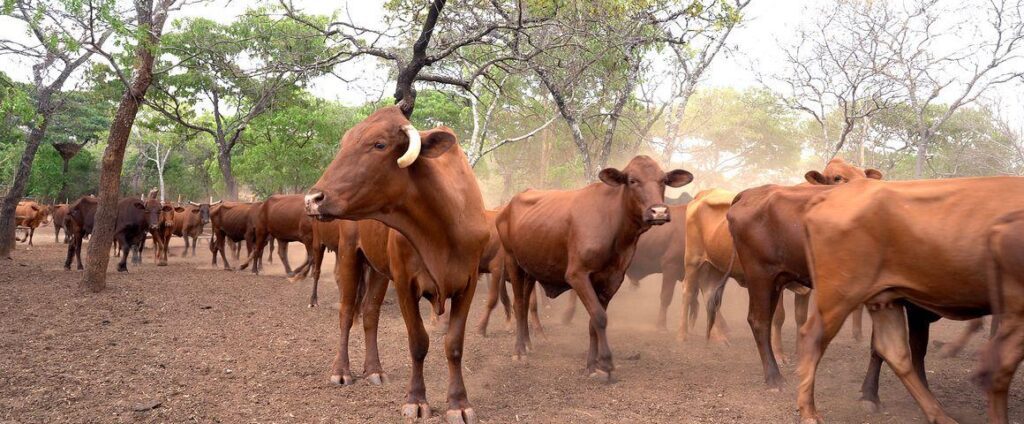Boosting Zimbabwe’s Livestock Resilience Through Climate-Smart Agriculture
With climate change threatening to disrupt livestock production in Zimbabwe’s drier regions, a major EU-funded project is working to help smallholder farmers adapt through innovative climate-smart agricultural practices.
The Livestock Improvement Systems Project (LIPS-ZIM), a 5 million euro initiative, is supporting the Zimbabwean government in nine districts across six provinces to improve animal production, health, and natural resource management.
“Climate change is having a significant impact on livestock production systems in regions iv and v of Zimbabwe, which are naturally low rainfall areas,” explained LIPS-Zim project coordinator Sikhalazo Dube.

Decreased Rainfall
He added, “With further decreases in rainfall expected, we are focused on introducing technologies and practices that can help animals and farmers adapt.”
A key part of LIPS-ZIM’s work involves promoting climate-smart forages and feeding systems.
“We’ve introduced technologies like velvet beans, lab lab, and dual-purpose crops such as cowpeas that are more drought-tolerant and nutritious,” said Dube.
He further pointed out, “We’re also training farmers on preservation and processing techniques to maximise the use of available feed resources during the lean season.”

Animal Nutrition
In addition to improving animal nutrition, the project is also working to identify livestock breeds that are more resilient to heat stress.
“Adapting to elevated temperatures is crucial, so we’re supporting the government’s efforts to evaluate and promote breeds that can thrive in these conditions,” Dube explained.
Recognizing the importance of community engagement, LIPS-ZIM has placed a strong emphasis on co-creating solutions with local farmers.
Indigenous Knowledge
“Cooperation and incorporating indigenous knowledge is very important for us. We want to make sure the technologies we introduce are well-adapted and accepted by the communities we work with,” Dube said.
This approach appears to be paying off, with evidence of successful technologies spreading beyond the project’s target areas.
“If you go to neighbouring districts like Murewa, you can see farmers adopting some of the practices we’ve introduced in Mutoko,” Dube noted.
Key Innovations
The project has already reached over 5,000 farmers directly, with many more impacted through their interactions. Among the key innovations that have been widely adopted are water-saving techniques like plastic mulching and rainwater harvesting.
“Climate-smart agriculture is at the heart of what we do,” said Dube.
He highlighted, “We’re not just looking at increasing productivity, but ensuring these systems are resilient to the impacts of climate change.”
Disease Surveillance
In addition to the agronomy and livestock components, LIPS-ZIM also has a strong focus on animal health and disease surveillance. The project has rehabilitated laboratories in Gwanda and Masvingo to improve local diagnostic capabilities and reduce the need for samples to be sent long distances.
“Having these facilities closer to the communities means faster turnaround times and lower risks of contamination. It’s all about making the animal health system more responsive and effective,” explained Dube.
Long-term Sustainability
As LIPS-ZIM enters its 5th year of operations, Dube is optimistic about the project’s long-term sustainability. “We’re not just introducing technologies and walking away,” he said. “The co-creation process ensures farmers and other stakeholders have a real sense of ownership, which is crucial for lasting impact.”
With climate change posing an ever-greater threat to Zimbabwe’s livestock sector, initiatives like LIPS-ZIM will be vital in helping smallholder farmers adapt and thrive. By combining innovative practices with inclusive, community-driven approaches, the project is working to secure a more resilient future for the country’s pastoral communities.
#News in Bulawayo #News in Zimbabwe Artist Arts BCC Bulawayo Bulawayo City Council Bulawayo economy Bulawayo industry Bulawayo news Bulawayo Police Bulawayo Water Bulawayo Water Crisis Bulawayo Women entrepreneurship Business Women Cholera Community Culture Currency Drug Abuse Drugs Economy Farmer Farmers Farming Informal Sector Informal Traders Mining MSMEs Music News in Bulawayo News in Zimbabwe Police Police in Bulawayo Vendor Vendors water Water Crisis Water Shortage water supply issue Women entrepreneurship ZESA Zimbabwean economy Zimbabwe news Zimbabwe water crisis ZRP
Join us for all News in Bulawayo and Bulawayo News in Zimbabwe.












